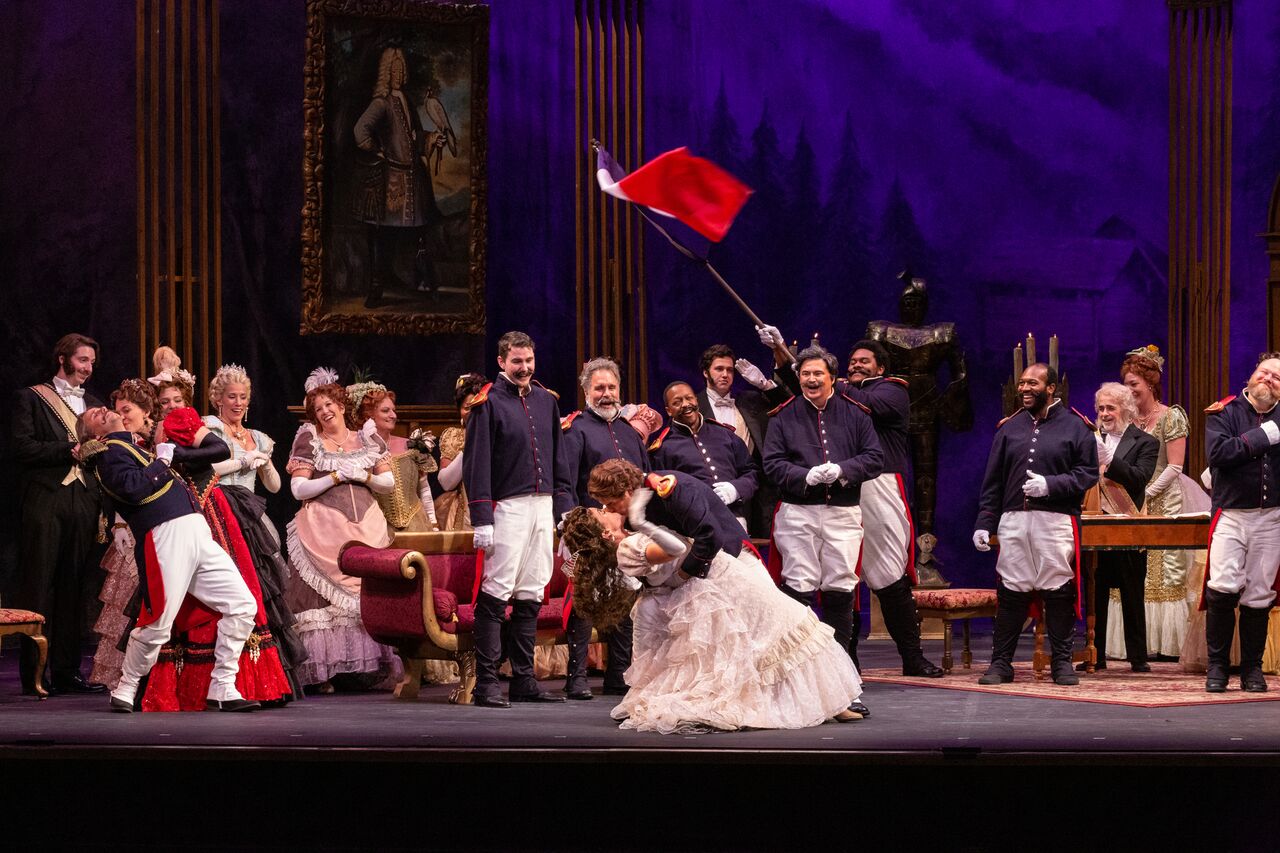Late in his prolific career, including nearly 30 operas composed between 1822 and 1830, Gaetano Donizetti did something he had never attempted before. After briefly becoming the pride of Naples – until the King censored his Poliuto in 1838 – Donizetti moved to Paris, premiered his banned opera in a translated revision, and set out to write a new work, La Fille du Régiment, to a French libretto by Jules-Henry Vernoy de Saint-George and Jean-François Bayard. Disdaining the subsequent La Figlia version in Italian, Opera Carolinaamply justified changing the title to The Daughter of the Regiment, bringing in American soprano Sarah Coburn to sing the lead in her Charlotte debut and translating all spoken dialogue into English. Directed by Alain Gauthier, the new production sported scenery by Brian Perchaluk that was quite conventional and Tyrolean, but the flavor of the comedy was a bit saltier and bawdier than others I’ve seen, both at the Met in HD performance in 2008 and at the previous Belk Theater staging of Donizetti’s Daughter in 1996.
Somber and forlorn, the opening bars of the overture didn’t seem to be heralding any comedy at all until the score took a hairpin alpine turn and became quite bubbly and Rossinian, no challenge at all for the Charlotte Symphony Orchestra under the baton of Stephano Romani in his Opera Carolina debut.
***
We then turned back to mournfulness as the chorus of hapless Tyroleans hoped and prayed that the invading French would be repelled. Marie, a foundling who has been brought up by the triumphant 21st Regiment since she was a babe in her cradle, entered with her surrogate father, Sergeant Sulpice – in a decidedly sunnier mood. Yet amid her conquering exhilaration, Marie was mooning over her shy, newfound Tyrolean love, whom she hadn’t seen since he heroically risked his life to save hers.
Almost on cue, Marie’s dreamboat arrived, clad in unmistakably Tyrolean overalls, a prisoner captured by the rest of the regiment. Of course, the ostensibly civilized Frenchmen want to execute Tonio instantly as a spy. Otherwise, how could Donizetti have his Marie pleading lyrically for her beloved’s life? Tonio’s impending doom was one of three readily apparent obstacles to the lovebirds’ bliss. Marie and Tonio haven’t actually declared their love for one another yet, and Sulpice reminds her that she is duty-bound to marry one of the grenadiers from the 21st. Sweeping the first complication aside drew forth Sulpice’s paternal love and his soldiers’ soft-heartedness, leaving Marie and Tonio alone to make their declarations in a rather adorable duet.
Tonio seemed to have solved the final complication before intermission, enlisting in the regiment and qualifying for Marie’s hand. But his timing was disastrous. The Marquise of Berkenfeld, in seeking safe passage to her chalet from the Napoleonic conquerors, has discovered that Marie is actually her daughter – although she tells Sulpice that she’s her niece when he discloses the proof, a letter he has saved from Marie’s long-discarded cradle. Just as he makes his first entrance in his new uniform, proud of his ingenuity, Tonio finds out that Marie is nobility, to be whisked away to her hereditary chalet. This time, Tonio couldn’t follow his beloved. Nope, he has just taken on the obligations of enlisted man, occasioning Marie’s heartbroken aria of farewell, crying out “Il faut partir!” so many times that I lost count.
***
In Marie’s staunch and unquestioning devotion to duty, I couldn’t help seeing a parallel to Frederic, the long-indentured “Slave of Duty” in Gilbert & Sullivan’s Pirates of Penzance. There were also times when Sulpice and his invading soldiers reminded me of the Pirate King and his unexpectedly patriotic marauders. Although Coburn didn’t march across the stage with drumsticks, a facet of the infectious “Rataplan, Rataplan” regimental song in many early productions, she was definitely primed for Gauthier’s comical garnishments. There was a Shirley Temple flavor to Coburn’s military bearing in Act I when she was in uniform, and a nicely calibrated awkwardness in Act II when Marie must dress up like a lady. Coburn pouted and moped as winningly as she flirted and exulted. If she didn’t quite hit all of her notes with the same authority and effortlessness, there was almost always a beautifully pure quality to her voice and admirable control of her trills and vibrato. Coburn warbled rather than wobbled and possessed impressive power when she tapped into it.
As Tonio, tenor David Walton had the opportunity to upstage his leading lady. Although conspicuously of peasant stock, in the reprise of his famed “Ah, mes amis, quel jour de fête” aria, Tonio must scale no less than nine high C’s in the space of just over a minute, entitling the fortunate few tenors who can reach those heights to be called “King of the High C’s,” as Luciano Pavarotti was. Walton did reach that summit more effortlessly than Coburn in her most stratospheric flights, and his “Ah, mes amis” came off as an aria rather than an athletic feat. But this Tonio was never nearly as characterful as his beloved, and he couldn’t match the thrilling power of her voice. Until he can muscle up vocally and develop some acting chops, I’d rank Walton as a duke, perhaps a prince.
There’s no villainy in Daughter, and hardly as much greed, pretension, and pettifoggery as we find in The Barber of Seville. Thus it’s hardly surprising that bass-baritone Matthew Burns as Sulpice and mezzo Maariana Vikse as the Marquise came off as rather pallid in barring our protagonists’ road to happiness. Burns was able to show some avuncular charm toward Marie, and Vikse had the opportunity to sashay across the stage in A.T. Jones’ most splendiferous costume designs. Small wonder that Gauthier has added more color to them both at the end by inserting some mutual attraction.
Even more comical delights emanated from cast members who sang less. On the strength of last fall’s fopperies in Cyrano de Bergerac, bass-baritone Carl DuPont certainly deserved an Opera Carolina encore as Hortensius, the Marquise’s officious manservant, and he did not disappoint. After her Charlotte debut in The Marriage of Figaro last spring, soprano Diane Schoff returned to comedy on the Belk stage even more speedily, making a splash each time she entered as The Duchess of Krakenthorp, decked out in a black-and-gold Jones creation that evoked the Chrysler Building.
Marvelous to relate, Ruth Bader Ginsburg made her operatic debut in Washington as the Duchess almost exactly two years before last Saturday evening’s performance in Charlotte. Obviously, Gauthier is telling quite a different story in his version, with plenty of comic style of his own. Comic detailing extended deep into the chorus of soldiers in Gauthier’s first directorial outing with Opera Carolina. Those guys were having as much fun onstage as the subscribers out in the audience, and when the word spreads, there just might be sell-outs to the final performances ahead, for details of which, see the sidebar.
Written by Perry Tannenbaum. Read the full article on CVNC.


